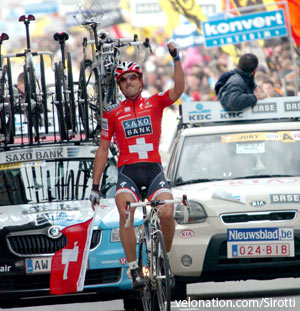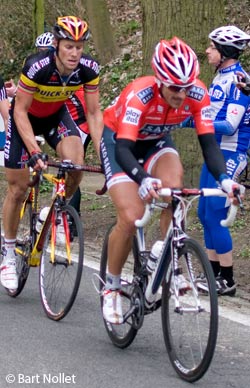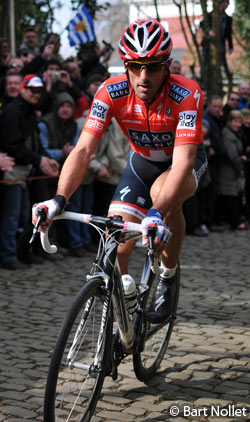 Two of the strongest riders on the roads of the Tour of Flanders simply rode away from the peloton on the Molenberg, with Fabian Cancellara then demolishing Tom Boonen on the Muur van Geraardsbergen. Philippe Gilbert and Björn Leukemans finished third and fourth, more than two minutes back, while American Tyler Farrar led home a larger chase group ahead of his compatriot George Hincapie.
Two of the strongest riders on the roads of the Tour of Flanders simply rode away from the peloton on the Molenberg, with Fabian Cancellara then demolishing Tom Boonen on the Muur van Geraardsbergen. Philippe Gilbert and Björn Leukemans finished third and fourth, more than two minutes back, while American Tyler Farrar led home a larger chase group ahead of his compatriot George Hincapie.
Cancellara’s attack was amazing, as he stayed seated and just rode away from Boonen on the steepest part of the Muur. Boonen jumped out of the saddle and gritted his teeth, but even the loud Flemish fans were unable to shout him back into contention.
The two then delivered an incredible time trial, with Cancellara certainly having an advantage in this discipline. The Swiss rider mastered the Bosberg and used the tailwind to win by a minute over Boonen.
Cancellara crossed the line with a flag of his country in his hand, celebrating the first Swiss win in ‘De Ronde van Vlaanderen’ since Henry Suter won the race in 1923.
Cancellara didn’t know what to say about the long gap. “I always knew that it was 1923 that a Swiss won. The most difficult was to enter the race as the top favorite. To win then is the greatest thing for a racer,” he said on Belgian TV.
Cancellara and Boonen took off at the Molenberg, with 44 kilometers to go. “I looked for a decision early and I think I did everything right, even though I had to change bicycles twice.”
His acceleration on the steeper parts of the Muur put Boonen in trouble quickly. “The Muur is a legend. When you have a dream, a goal, you try everything. All of a sudden I was by myself and then I just wanted to get to the finish as quickly as possible.”
Cancellara still has some goals left, despite achieving so many things already. “So far I have won three of the five monuments. This race has been won by great champions and to belong to the list makes me very proud. It was a lot of work and I needed the support from my team, my family, my surroundings.”
Cancellara finally took the win that he wanted for a long time. “I tried for years to win this race, but something always went wrong. I stayed calm and I had big help from my team today, without which you cannot win.”
Boonen was quite disappointed with yet another second place, after Milano-Sanremo and the E3 Prijs. “I had to give Cancellara 15 meters [on the Muur] and then he was gone.” Boonen didn’t quite know what happened. “I felt well and I was sitting on the front. I wanted to accelerate,” Boonen said to Belgian TV after the race. But it was Cancellara who put in a higher gear. “When we were at the top, he was a hundred meters away,” Boonen said. “If I could have stayed with him there I could have beaten him in the sprint,” he added.
Boonen now hopes for another Paris-Roubaix win. “I have done it a couple of times and I have gotten better over the last few years. In the Ronde good and in Roubaix super,” was the wish of Boonen.
Unruly beginning
On Easter Sunday, the Grote Markt, the market square in Brugge where the race started, was packed with people. Before ten o’clock the racers were off, with 262km ahead of them.
Shortly after the official start, a break formed with Michele Merlo (Footon-Servetto), Nicolas Rousseau (AG2R), Joost van Leijen (Vacansoleil), Floris Goesinnen (Skil-Shimano) and Vicente Garcia Acosta (Caisse d’Epargne). Garcia Acosta dropped off quickly, when he had a flat tire – another proof that you cannot take anything for granted in this race. The others waited for him, though, and off the five went again.
They quickly gained five minutes and while some riders tried to bridge up still, it was relatively quiet in the peloton – except for Martijn Maaskant, who crashed after colliding with his Garmin team car.
After almost 70km, three riders – David Boucher (Landbouwkrediet), Olivier Bonnaire (Française des Jeux) and Mikhail Ignatiev (Katusha) – managed to bridge to the front. Ignatiev is not from the region, but his helmet featured the lion of Flanders, found on the yellow flags in the area, which gave him bonus points with the spectators. After 80km, the gap to the bunch was already 15 minutes.
Quick Step and Sky controlled the peloton’s pace, which reduced the gap to 12 minutes after 100km. Shortly before the first climb at Den Ast, a crash in the peloton delayed some riders, including Tyler Farrar. But the Gent-resident easily made it back to the bunch.
 First climb at halfway point
First climb at halfway point
The first climb of Den Ast was placed exactly at mid-point, at km 131. The bunch started to reduce the gap under the ten-minute mark.
With about 112km to go, a typical scene best describes the Ronde van Vlaanderen: The bunch had to slow on some narrow cobble sections and riders in the back were too fast and crashed. This promptly put some racers in the position to chase after the wheel changes – not easy with the wind, as small groups formed multiple echelons in an effort to catch up again.
RadioShack’s Sébastien Rosseler flatted shortly thereafter and had to chase back. Once re-integrated in the peloton, he flatted again. The joy of Flanders.
The increased pace put the gap to under six minutes for the seven front runners. Just four kilometers later, the same crash scenario repeated. An Astana rider fell, which had a ripple effect.
The peloton stretched out over the cobble section in the Varenstraat, with a little more than 100km to go. The gap was down to a good four minutes. Over the Kluisberg, Ignatiev led the break and Saxo Bank guided the peloton with an impressive show of force.
Aleksandr Kuschynski crashed, which put yet another split into the bunch. The split continued through the Oude Kwaremont and with the fight for positions in the front, the second group had no chance of getting back into the bike race – with 84km still to go. The first remnants of the break were also passed by the peloton, still led by Saxo Bank, as well as Cervélo and Sky.
On the descent, the front riders passed a few colleagues – how did they get there? Knowing the course is important and a group of racers decided to skip the Kwaremont and head straight to the Paterberg! A clever strategy which unfortunately didn’t go unnoticed by the commissaires.
The peloton had already broken in several pieces ahead of the Paterberg, with Saxo Bank still looking strong. Boonen, Hoste, Hincapie, Flecha, and Hushovd were still there. The notable absent rider was Devolder, who was quite far back at the top of the Paterberg.
A group of ten was ahead, but Boonen’s attempts to get the group going did not work, mainly because Saxo Bank did not have Cancellara in it. This allowed several riders to catch back up before the Koppenberg.
The usual mayhem on the Koppenberg
Van Leijen, Garcia Acosta, Ignatiev and Goesinnen were the riders left in the break and tackled the Koppenberg around 45 seconds ahead of the chasers.
Chainel was looking good until he lost his momentum and had to run up the hill, but he is a cyclocrosser by trade. Breschel looked extremely strong, emerging ahead at the top of the Koppenberg together with Boonen, with both riders having a small gap over the others.
The Koppenberg was followed by the second feed zone, with 70km remaining. This was much welcomed by both the riders who wanted to finish and those who wanted to quit.
Three riders were left in the front, after Garcia Acosta dropped away and they still had over 40 seconds on the Mariaborrestraat, a bad cobbled section. This was followed by the short climb of the Steenbeekdries and another cobbled descent. Through all that, Lance Armstrong hung on in the 50-strong group of favorites, which was now led by the Sky team.
The Taaienberg at 63km to go provided two surprises – one was that Boonen did not attack like he had in the past. The pace was rather neutral until almost the top, which allowed the second surprise – the return of Devolder, who did not look to good earlier in the race.
This was finally the end of the remaining three riders in the break, who were reeled in on the climb of the Eikenberg, with 60km to go. Ignatiev and Goesinnen were defiant and pulled the Sky team up the hill.
Cancellara had a mechanical problem with 57km to go, over the Holleweg, a 1500m cobbled section. After a quick talk with the sports director, the Saxo Bank car passed Cancellara on an uphill, then stopped. Cancellara quickly changed bikes and was back in the peloton in no time. Just a couple of kilometers later it was Saxo Bank’s Breschel, who also changed bikes, but a lot slower than Cancellara. A teammate tried to pace Breschel pack to the group, but Sky applied the pressure ahead of the Molenberg.
Hushovd and Boom were also caught out by this acceleration, with 51km to go. Mathew Hayman was the one who dropped everybody – and it was Armstrong who organized the chase.
 Decision time on the Molenberg
Decision time on the Molenberg
Next up was the Molenberg, with 44km to go. This was Spartacus time, as Cancellara accelerated hard. Boonen answered with a little bit of delay, but both had a good gap at the top, quickly building up a lead of 15 seconds.
Sky was chasing behind, as the splintered group tried to get back together to one cohesive unit. But pressured by Gilbert’s attack, this was difficult.
The two front runners were able to take advantage of the cobbled Haaghoek to increase their gap even more. They also had the advantage of Devolder and Maarten Wynants breaking the chase efforts. After the Leberg, Cancellara and Boonen already had a gap of 28 seconds.
The chase group did not work too well, so David Millar took off in pursuit. Bernhard Eisel tried the same, but was shadowed by Armstrong. Boonen and Cancellara continued together over the Berendries, now more than half a minute ahead of the chasers. The group had broken into two, with Gilbert and Leukemans trying to bridge, gobbling up Millar in the process.
Cancellara and Boonen crested the top of the Tenbosse, with 27km to go, 53 seconds ahead of Millar, Gilbert and Leukemans. The chase group around Hincapie was already 1’17 back.
It looked like truce between Boonen and Cancellara as they rode up the Muur van Geraardsbergen. But close to the top of the Muur, at the steepest slopes with 20 percent, Cancellara accelerated without even getting out of the saddle. He simply rode away from Boonen. Millar was dropped from Gilbert and Leukemans as well on the steep cobbled section.
Cancellara then proved to be the better time trialler, as he quickly increased his lead to half a minute.
2010 Tour of Flanders results – 262km
1 Fabian Cancellara (Saxo Bank) 6h25’32
2 Tom Boonen (Quick Step) 1’13
3 Philippe Gilbert (Omega Pharma Lotto) 2’10
4 Björn Leukemans (Vacansoleil) 2’13
5 Tyler Farrar (Garmin-Slipstream) 2’34
6 George Hincapie (Columbia-Highroad)
7 Roger Hammond (Cervélo TestTeam)
8 Maxim Iglinsky (Astana)
9 Danilo Hondo (Lampre)
10 William Bonnet (Bbox Bouygues Telecom)